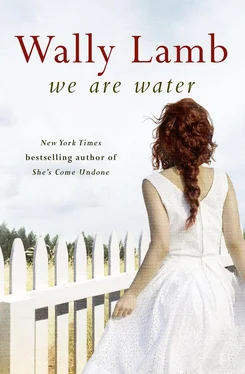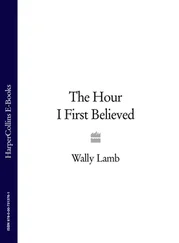“Good article, don’t you think?” I said, when I looked up from Connecticut magazine to her. I was hoping she’d say she’d been misquoted. Misunderstood. Instead, she said, “Pretty good. It’s weird to see yourself in a magazine, though. I feel … exposed, I guess.”
“Well, isn’t that what artists want? Exposure?”
She shrugged.
“Good picture of you.”
She made a face. “I wish my hair didn’t look so flat,” she said. “I can’t believe that, on the one day I was having my picture taken for a magazine, our hair dryer died.”
“Yeah, well … It’s interesting what it says about your work.”
No response.
“I mean, who knew you were so angry?”
“Oh, I don’t know, Orion. Maybe someone who was bothering to pay attention.” She walked out of the room.
I tossed the magazine onto the coffee table, got up, and followed her down the stairs to the basement. For a minute or more, I watched her yank towels out of the washing machine and slam them into the dryer. “You know something?” I said. “I don’t exactly appreciate you projecting your own marital shortcomings onto me.”
She turned and faced me, furious. “Do me a favor,” she said. “Speak English, not psychology.”
“Okay. Sure. Somebody in this marriage hasn’t been paying much attention to the other person, but it sure as hell isn’t me.”
“Oh, right. You’re just the perfect husband, aren’t you?”
“No, I’m the im perfect husband. But I think you’ve got it ass-backward as far as who’s been ignoring who.”
“Oh, really? Gee, Dr. Oh, I’m so sorry for ‘projecting,’ as you put it. And for having a career of my own.”
It was April. I had just done our taxes. “Yeah, speaking of careers, you know how much I contributed to our income this past year? Sixty-two grand. And you know how much you made? A whopping seven hundred dollars. So I think you’d better thank your lucky stars instead of bitching about my career.”
“Oh, you’re right as usual, Dr. Oh. Thanks so much for throwing that in my face and helping me see the light.” And with that, she lifted the lid of our top-loading washing machine and slammed it down. Lifted it again and slammed it. Lifted, slammed. Thanks in part to “Annie Oh’s Angry Art,” we had just entered the thrust-and-parry phase of our marriage.
Over the next several days, each of us accused the other of myriad slights and failures, large and small. The fighting exhausted us both, and our lives were already pretty exhausting. She began giving me the single-syllable treatment. “Good day today?” “Yup.” “Want to get a sitter this weekend? Go see a movie or something?” “Nah.” In the midst of that uneasy near-silence, I reread that Connecticut magazine article and came upon a couple of paragraphs I’d missed the first time. She’d told the reporter that, once upon a time, another artist had lived on the grounds of the house where we lived—a black laborer who’d taken up painting—and that she’d discovered one of his “compositions” that had been left behind. I knew the one she was talking about: a crazy-looking circus scene we’d found when we were cleaning out the attic. To my mind, it was strictly amateur, not to mention a little freaky-looking, and I’d wanted to throw it out along with the other junk up there. But Annie had said not to. It had “spoken to her,” she told that reporter, which was news to me, and when she set up her studio in the basement, she’d brought it down there for inspiration. (Oh, she’d set up that work space? So much for the work I’d done for her down there.) In the article, she said she might even have “seen” this would-be artist, who was long dead by the time we moved in. Had seen him twice, in fact. Once out back in the yard—a big, muscular guy in overalls looking up at her as she stood at one of the upstairs windows—and another time down in her studio. Both times, she said, he’d looked right at her, nodded, and then faded away. It hadn’t scared her to see him, she said; it had reassured her. Oh great, I remember thinking. Now she was seeing ghosts? Then how come I’d never heard about this? No, I figured, she wasn’t seeing people that weren’t there, except maybe in a dream she’d had. More likely, she had told the writer that because, hey, who doesn’t love a good ghost story? It wasn’t like Annie to fabricate stuff like that, but since she’d become an artist, she’d exhibited all kinds of new behaviors. And so I didn’t challenge her on it. “Annie Oh’s Angry Art” had already caused problems for us. I let it drop.
I finally got us a referral to a marriage counselor, despite Annie’s suspicion that the deck would be stacked in my favor because she’d be the only person in the room who wasn’t a therapist. I hired us a sitter for Tuesday evenings. (Katie had been my student coordinator for Date Rape Awareness Week.) And so for the next several weeks, Annie and I drove to Glastonbury to see Suzanne in her office full of philodendrons and ferns and hand-thrown clay pots that she had made, glazed, and fired in her wood-stoked kiln. She gave us one of those pots at the end of our first session—an imperfect one. A piece had broken off and been glued back on. “My point is this,” Suzanne said, passing her finger over the crack. “This is where the pot is strongest now: at the place where it had been broken.”
“How was tango class tonight?” Katie would ask when we returned home from our marriage counseling sessions. I’d invented our tango lessons so that I didn’t have to tell her we were trying to fix our marriage.
“Great. How were the kids?”
“ Super good! They’re such cuties. And you know, I think it’s super cool that you guys are learning the tango. I wish my parents weren’t such fuddy-duddies about stuff like that. Get out of their comfort zone? Forget it. They’d rather just sit there watching TV.”
Whether or not we were doing the tango up there in Glastonbury, we were definitely out of our comfort zone. But it was worth it. We did repair things. For quite a while, actually. Becoming less accusatory of each other lessened the tension. We practiced better teamwork with the twins and the house stuff, better listening skills, worked on more open communication. Hey, I’m a psychologist; it’s not like I didn’t already know a lot of these strategies. But knowing how to advise others in dealing with their shit doesn’t necessarily mean you’re going to tackle your own without having to check in with a third party once a week. And besides, my patients range in age from eighteen to about twenty-one, twenty-two. Their relationships are more about managing the drama than maintaining a marriage. Suzanne likened the latter to servicing a car you love and want to last. Listen to the engine, rotate the tires, check the oil. Things got better for us intimacy-wise, too. I became more patient. She became more communicative about what she wanted. She had more orgasms than she’d ever had before, and damn if I didn’t enjoy giving them to her … I mean, it wasn’t happily ever after, not by any stretch. She was still distant sometimes, both in our bed and out of it, and I still overdid it sometimes, work schedule-wise. But it definitely got better. Our “tango lessons” went from once a week to once a month, and then to once every three months. Marriage as car maintenance: I was a little put off by the metaphor at first, but as it turned out, Suzanne knew her stuff. Things were much better for Annie and me. And then she got pregnant again and they weren’t …
“Their skin is covered with small toothlike scales, so they’d be virtually unaware that they’re being embedded,” Dr. Skelly is telling the Mad Hatter. “These tags use satellite technology, so that lets us—”
Читать дальше












